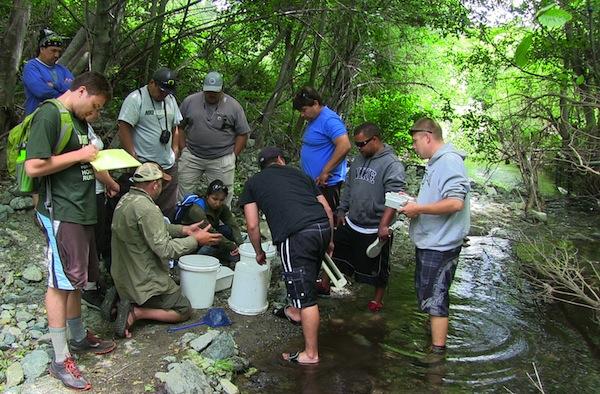April 21, 2014. Source: Warrior Publications
U.S. Department of Interior Secretary Sally Jewell, State of Oregon Governor John Kitzhaber, State of California Governor Jerry Brown, Oregon Senator Ron Wyden, Oregon Senator Jeff Merkley, Klamath Tribes elected officials and Klamath Basin irrigators held a “celebratory” signing of the Upper Klamath Basin Comprehensive Agreement last Friday at Collier Park, 4 miles north of Chiloquin. With strong support from Senator Wyden, he stated “I am going to introduce in the first few days of May, legislation in partnership with Senator Merkley to make this agreement law.”
But the “celebration” was not held without opposition. Members and descendants of the Klamath, Modoc and Yahooskin tribes came together to object to the UKBCA stating that tribal membership had less than a month to review the 93 page document. Tribal Council only allowed 19 days from the mailing of the ballots by the election company to the deadline for return.
Although their addresses are current and updated, a large portion of membership either did not receive a ballot or did not did receive a ballot in time to cast a vote before the deadline. Therefore, membership feels proper voting procedure was not implemented and they did not have adequate time to make an informed decision in the referendum vote, which had a deadline of April 9th 2014 postmarked by 9 am.
“To me this is a violation of the code of ethics that the Tribal Council signed at the beginning of their term. They showed no moral principal with this act. I hope they can live with themselves after they have ignored their membership.” – Anonymous Klamath Tribal member
Tribal members also stated that this agreement does not reflect the cultural values that they would like to see included in any agreement that brings their Treaty rights into discussion. Tribal membership did not have any direct involvement in the negotiation process and feel that Klamath tribal elected officials do not retain the sovereign authority to make decisions on behalf of the entire tribal membership.
Those in opposition to the agreement held signs stating *“water is life”, *“no more KBRA lies” and “my council does not speak for me.”
As signatories took their place to sign the agreement, tribal members moved to the front of the crowd to deliver a written testimony and to publically state why they were not in agreement with the proposed piece of legislation.
While the signing took place, a Klamath Tribes descendant burned a copy of the UKBCA to symbolize tribal membership’s disdain for the agreement. Tribal members were not given adequate time to make an informed decision and less than one third of eligible voting membership cast a ballot to grant signatory authority to Klamath Chairman Don Gentry. Many believe as a result, the outcome of the referendum is not reflective of overall enrolled members’ opinions, and therefore is inconclusive.
A statement released by the Hupa Tribe from Northern California criticizes the agreement stating it “surrenders their tribal rights for water and fishing.” Commissioners from Klamath and Siskiyou County were not in attendance, though they will be impacted by any agreement on the Klamath River. They say they consider this a “surrender” or a “sell-out.”






